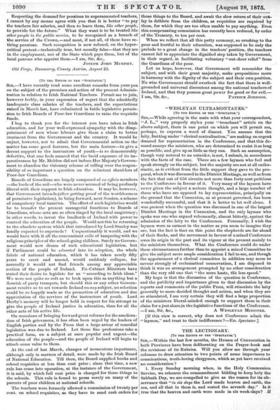"WESLEYAN ULTRAMONTANES."
[TO THE EDITOR OF THE "SPECTATOR."]
Sin,—While agreeing in the main with what your correspondent, "J. L.," very properly styles your "trenchant" article on the above subject, there is one point on which you will permit me, perhaps, to express a word of dissent. You assume that the laity, fretting under "clerical centralisation," are making an urgent demand for representation in the Conference, and that this de- mand annoys the ministers, who are determined to resist it as long as possible, and give up as little as they can. Such an assumption, though very natural to an outsider, is not, I submit, in accordance with the facts of the case. There are a few laymen who feel and speak strongly on the subject, but the majority are not at all enthu- siastic, as is evident from the little support they gave to the pro- posal, when it was discussed in the District Meetings, as well as from the fact that out of 656 circuits not more than forty sent petitions to the Conference in favour of it. Very many of the laymen have never given the subject a serious thought, and a large number of those who have are opposed to lay representation, principally on the ground that the Connexion, as at present governed, has been wonderfully successful, and that it is better to let well alone. I was present when the question was discussed in one of the largest District Meetings in the Connexion, and the only layman who spoke was one who argued vehemently, almost bitterly, against the admission of the laity to the Conference. Personally, I wish the laymen were as earnest in the matter as you seem to imagine they are, but the fact is that on this point the shepherds are far ahead of their flocks, and the movement in favour of a mixed Conference owes its origin in the past and its vigour at the present mainly to the ministers themselves. What the Conference could do under these circumstances further than to appoint a mixed Committee to give the subject more ample consideration I fail to see, and though the appointment of a clerical committee in addition may seem to savour strongly of ecclesiastical conservatism, I am disposed to think it was an arrangement prompted by no other consideration than the very old one that " the more baste, the less speed."
My hope is that the discussion of the question in Conference, and the publicity and importance given to that discussion by the reports and comments of the public Press, will stimulate the laity generally to more decided thought and action, and when they are so stimulated, I am very certain they will find a large proportion of the ministers liberal-minded enough to support them in their claim for a just sharein the legislative functions of the Conference.
—I am, Si', &c., A WESLEYAN MINISTER. [If this view is correct, why does not Conference admit the "laymen," and trust to their indifference?—En. Spectator.]






























 Previous page
Previous page